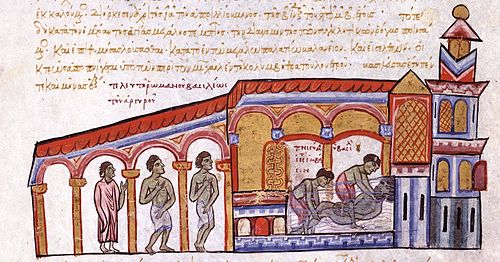Year 1034 (MXXXIV) Overview
The year 1034 was a common year that began on a Tuesday in the Julian calendar.
Significant Events
By Place
Byzantine Empire
On April 11, Emperor Romanos III (Argyros) met his demise, drowned in his bath at the urging of his wife, Zoë. Following his death, she married her chamberlain, who ascended the throne as Michael IV. Romanos was interred in the Church of St. Mary Peribleptos in Constantinople.
Europe
During the spring, Emperor Conrad II (the Elder) led a military expedition through the Rhône River into Burgundy. Simultaneously, two Italian armies, commanded by Archbishop Aribert and Boniface III (margrave of Tuscany), traversed the Alps to join forces with Count Humbert I at the Great St. Bernard Pass.
In March, Conrad II coordinated his forces at Lake Lemano, where he decisively defeated Count Odo II in battle at Geneva (modern-day Switzerland). As a reward for his support, Conrad granted Humbert I the Burgundian county of Maurienne.
King Mieszko II died in May after a six-year reign, likely as a result of conspiracy. His son, Casimir I (the Restorer), only 17 years old, succeeded him amidst a violent revolt that erupted across Poland.
King Sancho III (the Great) of Pamplona captured León following several victories over rivals, extending his rule from the western borders of Galicia to the County of Barcelona in the east.
Throughout the summer, Poland was fragmented into regions during what is known as the Pagan Reaction. Queen Richeza, Casimir I, along with his sisters Ryksa and Gertruda, were forced into exile in Germany.
On November 25, King Malcolm II died in battle at Glamis, and his successor was Duncan I, the son of his eldest daughter, rather than Macbeth, believed to be another grandson.
In Al-Andalus, taking advantage of the declining Muslim central authority, Gonçalo Maia, the count of Portugal, conquered Montemor-o-Velho.
Additionally, Franche-Comté came under the suzerainty of the Holy Roman Empire.
Africa
A fleet from Pisa and Genoa launched an attack on Bona (modern-day Annaba, Algeria), successfully occupying the city for one year.
Notable Births
- Joscelin I de Courtenay, French nobleman (House of Courtenay)
- Khön Könchok Gyalpo, founder of Sakya Monastery (d. 1102)
Prominent Deaths
- February 21 – Hawise of Normandy, French duchess and regent
- March 21 – Ezzo (Ehrenfried), German count palatine
- April 11 – Romanos III (Argyros), Byzantine emperor (b. 968)
- October 31 – Deokjong, ruler of Goryeo (Korea) (b. 1016)
- November 9 – Oldřich, duke of Bohemia
- November 19 – Theodoric II, margrave of Lower Lusatia
- November 25 – Malcolm II, king of Alba (Scotland)
- December 8 – Æthelric, English bishop
- Other notable figures: Adémar de Chabannes (French monk and historian), Ali ibn Hasan (Ali-Tegin) (Karakhanid ruler), and Mieszko II (king of Poland).

